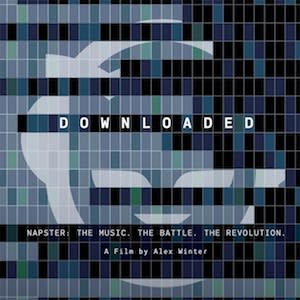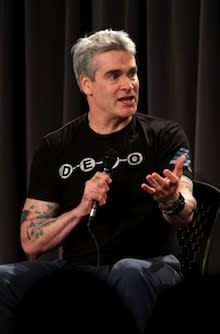Wake Up and Embrace the Technology, Urges Napster Documentary 'Downloaded'
It was perhaps inevitable that at the Q&A that followed a screening of Alex Winter's Napster documentary "Downloaded" on Monday night, one audience member would ask if the movie was going to be available on the internet for free.
The film, after all, chronicles the rapid rise and equally rapid fall of the file-sharing service that fundamentally changed the music industry, ushering in a generation of music fans who got their music for free online rather than paying for it in record stores.
To admirers, it was a revolution that put power in the hands of the fans; to the record industry, it was an assault on copyright and intellectual property, a case of organized piracy on a scale that virtually destroyed the music industry.
And since he'd made a non-judgmental movie about Napster, the questioner asked, would Winter be fine giving his movie away?
"I get that question a lot," Winter told TheWrap the day after his screening at the Grammy Museum in downtown Los Angeles. "And I don't want to disparage the people who think that all content should be free.
"But as a content creator, I'm not quite as eager to leap into a future of free content. And I still believe that we are close to developing a monetizable system in the digital landscape."
Winter – a director, writer and actor who is perhaps best known for starring as Bill alongside Keanu Reeves' Ted in "Bill and Ted's Excellent Adventure" in 1988 – is working on deals to show "Downloaded" in a variety of media, from theatrical to streaming to VH1.
He describes it as being similar to the model used on the Banksy documentary "Exit Through the Gift Shop," and says it is a way of adjusting to an independent-film arena whose old business models are as outdated as the record company models derailed by Napster.
"I've been a member of the DGA and the WGA and SAG my whole life, and I don't want to say anything bad about the people who pay my family's health insurance," he said. "But I can't believe the lack of understanding of the root technology that the public is using.
"People need to get educated very quickly, because there's no reason why we can't have a fully monetized system for distributing film using new technology."
"Downloaded" began life in 2002, shortly after Winter met Napster co-founder Shawn Fanning. Initially, he pitched it to MTV Original Movies as a narrative feature, got a green light and wrote a script. Then MTV, he said with a laugh, "folded their movie department and became a reality TV house," so he took it to MTV Films at Paramount, got another OK and wrote a new version in '04 and '05.
When that project went into turnaround, he abandoned the film for years – until frustration over the lack of progress on the issues raised by Napster persuaded him to revisit the material as a documentary featuring extensive interviews with those on all sides of the issue, including extensive interviews with Fanning and co-founder Sean Parker.
The film, which premiered at SXSW in March, is an evenhanded look at the firestorm stirred up by Napster, which was eventually forced to shut down when courts agreed with the record industry that it was a company based on copyright infringement.
But in a post-screening Q&A with Winter, musician Henry Rollins (left) and manager Jordan Berliant from the Collective Music Group, the consensus was that file-sharing and the online distribution of music was at least as much of an opportunity as an attack -- albeit an opportunity that was ignored by corporations clinging to an outmoded, dying business model.
"A lot of record companies, they are gun-clutching climate-change deniers," said Rollins. "They are stuck, and the rest of us are moving on."
His initial reaction to the brainchild of Fanning and Sean Parker (below), added Rollins, was straightforward. "Me being from punk rock, I was used to not ever being paid for music. I thought, 'Well, the record labels have been really good at keeping money away from the artists for years. Now the fans are doing it, too.'"
Still, added Berliant, "Napster really did lead to legitimate purchases of music. The dirty little secret in the aftermath of Napster is that more people are buying music than ever before.
"The problem is that they are not buying music in the same increments the record companies were used to."
The companies, he added, were unwilling to adjust to the move from the long-playing album to the single song as the basic unit of consumption – the first a transaction that would give the record companies about $10 wholesale, the second less than $1.
"The real collision is between the way consumers want to consume music and the way the record companies want consumers to consume music," Berliant said.
"Give me one example of a company that has succeeded … by forcing the consumer to adapt to how they want to do business, instead of the company adapting to how the consumer wants to do business. It's incredibly arrogant."
During the Q&A, Winter bemoaned the absence of any music-sharing service that offered the community of the early Napster, and the fact that what is viewed as the vast internet has effectively narrowed for many people to "Facebook, YouTube, Google and iTunes."
But all the panelists agreed that YouTube has the potential to be more than what Winter called "a garbage dump" for music, and that file-sharing still has the potential to be monetized and the ability to bring together a community of fans that artists can use to their advantage.
"Personally, I have never felt closer to my audience in my entire life," said Rollins. "I feel allied with the people who reach out to me on the internet, and distanced greatly from every record company I was ever on. Even the cool ones."
Added Berliant, "I'm betting on the relationship between the artist and the fan, and fuck everybody else in the middle. And I believe that dis-intermediation, which is what is going on, will breed something pure and positive."
Related Articles:
Oscars Overhaul Short-Documentary Rules, Plan to Expand Doc Branch
Indie Filmmakers Debate Post-Sundance: 'Where Is Harvey?' (Video)





